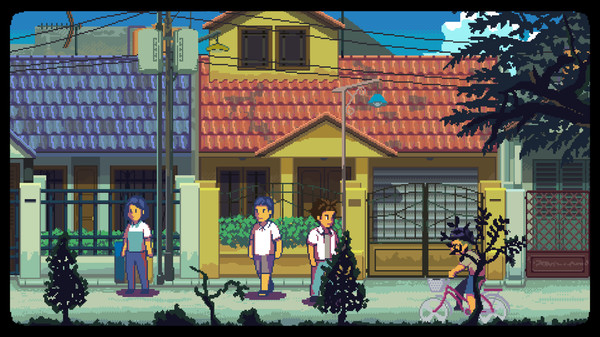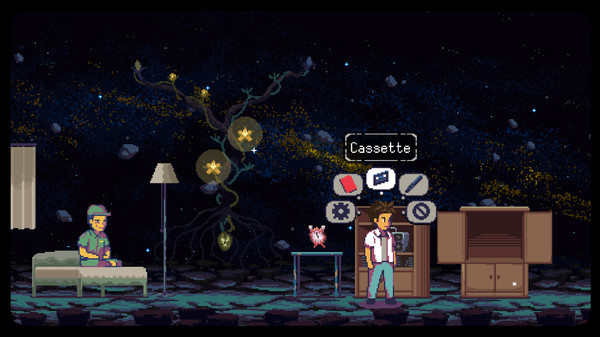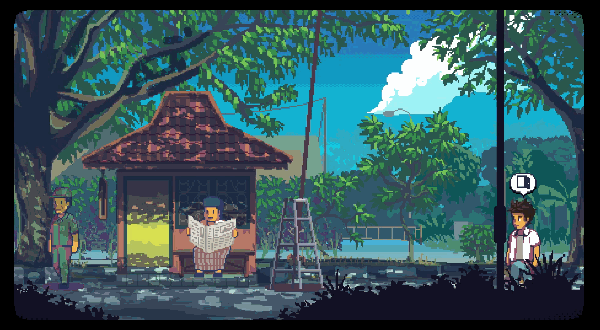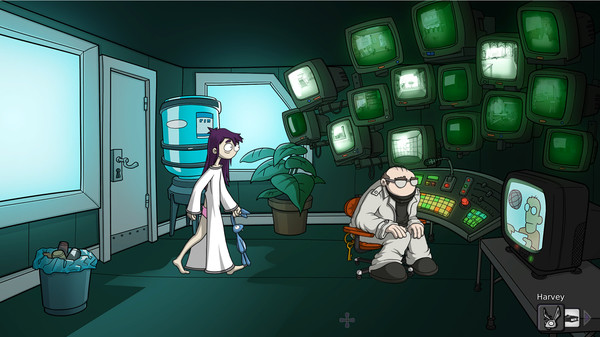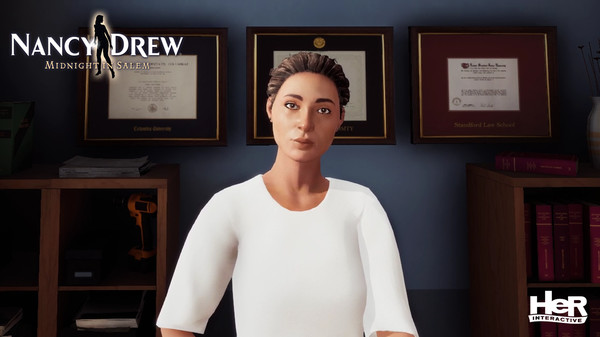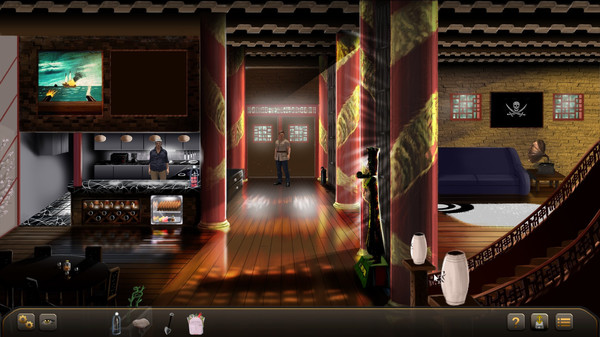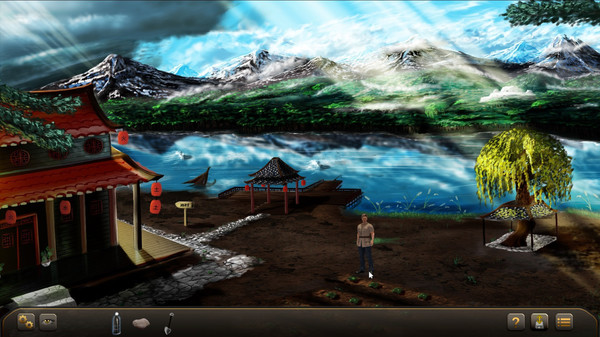Eric the Unready is the first Legend game to fully embrace the
LucasArts design methodology of no player deaths and no dead ends. Even if you deliberately try to throw away or destroy essential objects out of curiosity or sheer perversity, the game simply won’t let you; the object in question is always restored to you, often by means that are quite amusing in themselves. Just as in a LucasArts comedy, the sense of freedom this complete absence of danger provides often serves the game well, empowering you to try all sorts of crazy and funny things without having to worry that doing so will mean a trip back to your collection of save files. Unlike many LucasArts games, though,
Eric the Unready doesn’t even try all that hard to find ways of presenting truly intriguing puzzles that work within its set of player guardrails. In fact, if there’s a problem with
Eric the Unready, it must be that the game offers so little challenge; Bob Bates’s determination to make it the polar opposite of
Timequest in this respect carried all the way through the project.
The game is really eight discrete mini-games. At the start of each of these “chapters,” Eric is dumped into a new, self-contained environment that exists independently of what came before or what will come later. By limiting the combinatorial-explosion factor, this structure makes both the designer’s and the player’s job much easier. Even within a chapter, however, there are precious few head-scratching moments. You’re told what you need to do quite explicitly, and then you proceed to do it in an equally straightforward manner — and that’s pretty much all there is to solving the game. Bob long considered it to be the easiest game by far he had ever designed. (He was, he noted wryly when I spoke to him recently, forced by popular demand to make his recent text adventure
Thaumistry even easier, which serves as something of a commentary on the ways in which player expectations have changed over the past quarter-century.)
All that said, it should also be noted that
Eric the Unready‘s disinterest in challenging its player was more of a problem at the time of its original release than it is today. Whatever their other justifications, difficult puzzles served as a way of gumming up the works for the player back in the day, keeping her from burning through a game’s content too quickly at a time when the average game’s price tag in relation to its raw quantity of content was vastly high than today. Without challenging puzzles, a player could easily finish a game like
Eric the Unready in less than five hours, in spite of its having several times the amount of text of the average Infocom game (not to mention the addition of graphics, music, and sound effects). At a retail price of $35 or $40, this was a real issue. Today, when the game sells as a digital download for a small fraction of that price, it’s much less of one. Modern distribution choices, one might say, have finally allowed
Eric the Unready to be exactly the experience it wants to be without apologies.
Certainly Bob has fantastically good memories of making this game; he still calls it the most purely enjoyable creative endeavor of his life. Those positive vibes positively ooze out of the finished product. Yet there was a shadow lurking behind all of Bob’s joy, lending it perhaps an extra note of piquancy. For he knew fairly early in
Eric the Unready‘s development cycle that this would be the last game of this type he would get to design for the foreseeable future. Legend, you see, was on the verge of dumping the parser at last.
They had fought the good fight far longer than any of their peers. By the time
Eric the Unready shipped in January of 1993, Legend had been the only remaining maker of parser-based adventure games for the mainstream, boxed American market for over two years. As part of their process of bargaining with marketplace realities, they had done everything they could think of to accommodate the huge number of gamers who regarded the likes of an Infocom game much as the average contemporary movie-goer regarded a Charlie Chaplin film. In a bid to broaden their customers demographic beyond the Infocom diehards, Legend from the start had added an admittedly clunky method of building sentences by mousing through long menus of verbs, nouns, and prepositions, along with copious multimedia gilding around the core text-adventure experience.
As budgets increased and the market grew still more demanding, Legend came to lean ever more heavily on both the mouse and their multimedia bells and whistles. By the time they got to
Eric the Unready, their games was already starting to feel as much point-and-click as not, as the regular text-and-parser window got superseded for long stretches of time by animated cut scenes, by full-screen static illustrations, by mouseable onscreen documents, by mouse-driven visual puzzles. Even when the parser interface was on display, you could now choose to click on the onscreen illustrations of the scenes themselves instead of the words representing the things in them if you so chose.
Still, it was obvious that even an intermittent recourse to the parser just wouldn’t be tenable for much longer. In this new era of consumer computing, a command line had become for many or most computer users that inscrutable, existentially terrifying thing you got dumped into when something broke down in your Windows. The last place these people wanted to see such a thing was inside one of their games. And so the next step — that of dumping the parser entirely — was as logical as it was inevitable.
Eric the Unready wouldn’t quite be the absolute last of its breed — Legend’s
Gateway 2: Homeworld would ship a few months after it — but it was the very last of
Bob’s children of the type. Once
Eric the Unready and
Gateway 2 shipped, an era in gaming history came to an end. The movement that had begun when Scott Adams shipped the first copies of
Adventureland on hand-dubbed cassette tapes for the
Radio Shack TRS-80 in 1978 had run its course. Yes, there was a world of difference between Adams’s 16 K efforts with their two-word parsers and pidgin English and the tens of megabytes of multimedia splendor of an
Eric the Unready or a
Gateway 2, but they were all nevertheless members of the same basic gaming taxonomy. Now, though, no more games like them would ever appear again on the shelves of everyday software stores.
And make no mistake: something important — precious? — got lost when Legend finally dumped the parser entirely. Bob felt the loss as keenly as anyone; through all of his years in games which would follow, he would never entirely stop regretting it. Bob:
What you’re losing [in a point-and-click interface] is the sense of infinite possibility. There may still be a sense that there’s lots you can do, and you can still have puzzles and non-obvious interactions, but you’ve lost the ability to type anything you want. And it was a terrible thing to lose — but that’s the way the world was going.
I found the transition personally painful. That’s evidenced by the fact that I went back and wrote another parser-based game more than twenty years later. A large part of the joy of making this type of game for me is the sense that I’m the little guy in the box. It’s me and the player. The player senses my presence and feels like we’re engaged in this activity together. There’s a back-and-forthing — communication — between the two of us. It’s obviously all done on my part ahead of time, but the player should feel like there’s somebody behind the curtain, that it’s a live exchange. It should feel like somebody is responding as an individual to the player.
As Bob says, point-and-click games are … not necessarily worse, but definitely
different. The personal connection with the designer is lost.









![The Year of Incline [2014] Codex 2014](/forums/smiles/campaign_tags/campaign_incline2014.png)

